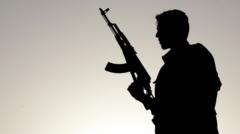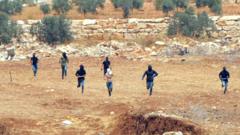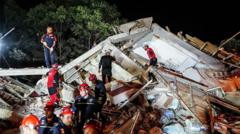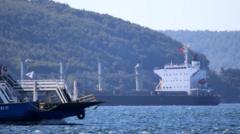The Kurdistan Workers' Party (PKK)'s recent announcement to end its decades-long insurgency against Turkey has stirred mixed emotions among families of fighters. While some express hope for peace and reunion with their loved ones, others remain skeptical about the effectiveness of the PKK's disbandment and the future of the Kurdish struggle. Personal narratives highlight the complexities of loyalty, loss, and the prospects of reconciliation in a region fraught with conflict.
Families of PKK Fighters Hope for Peace Amid Long-standing Conflict

Families of PKK Fighters Hope for Peace Amid Long-standing Conflict
As the PKK announces its decision to disband, families of fighters grapple with the implications of an enduring conflict and their hopes for reunification.
When the PKK declared its intention to disband and cease hostilities against Turkey last month, families of its fighters were filled with a mix of hope and uncertainty. Leila, a mother from Iraq's semi-autonomous Kurdistan Region, celebrated the news in the hopes of reuniting with her son, who had joined the group three years prior. Despite two short video messages from him, her motherly instinct drives her to seek a face-to-face meeting, something the group has yet to facilitate.
The PKK's announcement is considered a significant milestone in a conflict that has spanned 40 years and caused over 40,000 deaths, most of them civilians. Conversations with relatives of fighters reveal divided sentiments toward the group. Some criticize the PKK vehemently, while others honor their loved ones who died in the struggle, believing their sacrifices contribute to potential peace.
While the PKK has indicated a willingness to negotiate, a formal peace process remains elusive, with ongoing reports of violence suggesting that distrust persists. The PKK originally aimed for an independent Kurdish state but has recently pivoted towards seeking cultural and political autonomy for Kurds across Turkey and beyond.
During a recent attempt to access the PKK-controlled Qandil Mountains for insight on their current state, the BBC met resistance, as the group was reportedly engaged in discussions impacting their future structure and the handling of their arms. Tensions are pronounced, as PKK officials maintain that the disarmament of its members is not on the table.
Political analysts view Turkish President Recep Tayyip Erdogan's approach as potentially self-serving, aiming to garner Kurdish support for impending constitutional changes as his administration faces its own political pressures. Erdogan described the PKK's dissolution as a critical step toward eliminating terrorism, projecting hope for a new Turkish era devoid of violence.
Families of deceased fighters, like Rondek Takoor, reflect on the complex emotions intertwined with the prospect of peace. While they welcome the end of conflict, they confront the painful legacy of their losses, which imbue their identities with both grief and pride.
The potential disbandment of the PKK ignites questions about thousands of fighters and their reintegration into society, as Turkish officials weigh punitive measures for those perceived as criminal. The journey ahead is riddled with uncertainty, not only for the PKK's members but also for affiliated Kurdish groups in Syria and Iran facing their own local dynamics.
For parents like Leila, political maneuvers and military complexities are secondary concerns. Her longing remains simple yet profound: to embrace her son once more, which she believes will be possible once the hardships of guerrilla life near the Turkish border become too great for him to bear.




















